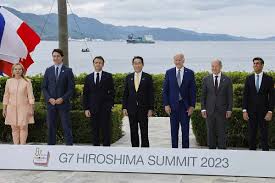The Group of Seven wealthy countries’ trade and economic representatives reaffirmed their commitment on Sunday to cooperate in order to maintain seamless supply chains for necessities like food and energy in spite of worldwide unpredictability.
In a joint statement, the countries pledged to uphold “a free and fair trading system based on the rule of law and enhancing economic resilience and economic security.”
Co-hosting the two-day event in the western city of Osaka, Japan, Foreign Minister Yoko Kamikawa cited the Israel-Hamas conflict and Russia’s invasion of Ukraine as the most recent dangers to reliable food and energy supplies.
She emphasized democracy, inclusivity, and human rights as she closed the gathering, saying, “We nations that share important values have a position of responsibility amid growing uncertainties.”
Industrialized countries are becoming increasingly concerned about ensuring a steady supply of computer chips and vital minerals like lithium, which are necessary in light of the current demand for electric cars and other renewable energy sources.
Japan, Britain, Canada, France, Germany, Italy, and the United States make up the G-7. Along with the European Union, Australia, Chile, India, Indonesia, and Kenya, economic organizations were invited to attend the two-day meeting, including the World Trade Organization.
In their joint statement, the G-7 countries reaffirmed their condemnation of what they described as “Russia’s brutal, unprovoked, unjustifiable, and illegal war of aggression against Ukraine.”
The panelists talked about the ways in which trade policy may support efforts to combat climate change, improve food security, advance digital trade, and advance sustainable development.
Although China was not specifically raised in the sessions, trade is one area where there have been increasing political difficulties with China.
Even though it wasn’t present at the meetings, China nonetheless stood out. In an effort to “safeguard national security,” China has placed export restrictions on germanium and gallium, two metals used in computer chips and solar cells.
Earlier this year, during the G-7 meeting in Hiroshima, southwest Japan, participants made a vague allusion to China’s manipulation of other countries’ reliance on commercial goods when they spoke of “economic coercion.” At the Osaka G-7, the same sentence was repeated once more.
As the guest country, Japan concentrated on pointing out that since the enormous leak of treated wastewater from the Fukushima nuclear facility, which suffered reactor meltdowns in 2011, China has prohibited the importation of Japanese seafood.
The G-7 countries have shown support and understanding for Japan’s stance, according to Japanese Minister of Trade and Economy Yasutoshi Nishimura. He emphasized that Japanese food is safe since it is based on scientific evidence, including that from Fukushima. He assured reporters that Japan would keep pushing for the lifting of the food restrictions.
Additionally, Nishimura stated that Australia and India, two of the guest countries attending the G-7 summit, were potentially strong allies in bolstering the supply chain for important commodities.
A bilateral agreement was reached on the sidelines between Japan and Britain to collaborate on mineral supply chains, which both countries claimed were necessary for achieving sustainable energy and a strong national defense.
Additionally, Japan and the EU came to an agreement on digital data exchanges, reaffirming their shared commitment to developing standards to promote trade in the digital sector, including online exchanges.
In their meeting, Kamikawa also reaffirmed their shared commitment to “the free and fair economic order” and discussed the significance of women taking on more leadership roles in the G-7. Kamikawa also met with Katherine Tai, the U.S. Trade Representative.

















